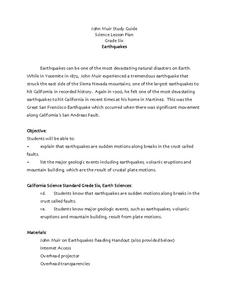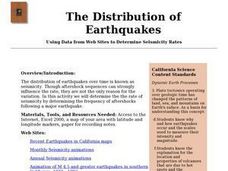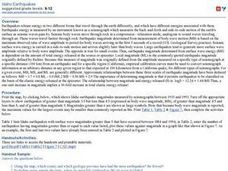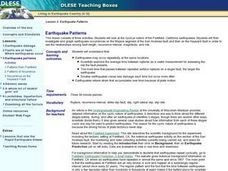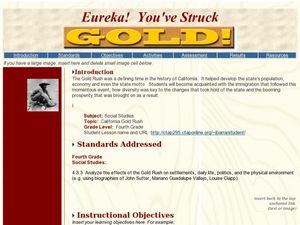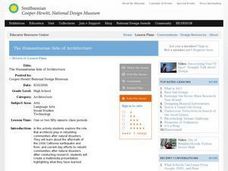Curated OER
Earthquakes
Sixth graders explore reasons for earthquakes. They discuss and describe the types of faults. Using the internet, 6th graders research a specific location of a former earthquake. They describe the damage, magnitude, the epicenter,...
Curated OER
The Distribution of Earthquakes
Students determine the rate of seismicity by determining the frequency of aftershocks following a major earthquake. They incorporate the use of the Internet, Excel 2000, a map of their area with latitude and longitude markers, and paper...
Curated OER
Idaho Earthquakes
Students examine the types of earthquakes that occur in Idaho. In groups, they compare and contrast the types of energy released and how they affect the movement of the Earth. To end the activity, they analyze a map showing the...
Curated OER
Finding an Earthquake's Epicenter
High schoolers examine the process used to identify the epicenter of an earthquake. They identify the Richter scale and interpret a seismograph reading. They also view photographs of the aftermath of earthquakes.
Curated OER
Shake, Rattle And Roll: Studying the Effects of an Earthquake
Students gauge earthquake intensity by reviewing firsthand accounts. They use the Modified Mercalli Intensity Scale and newspaper articles to estimate the strength and effects of a past earthquake.
Curated OER
Shake, Rattle and Roll
Students explore how to locate the location of an earthquake and why earthquakes happen more frequently in some areas more than others.
Walt Disney Company
Disaster Preparedness Activity Book
Join the American Red Cross as well as Mickey and friends as they help to prepare young scholars for natural disasters. After reading brief informational passages about earthquakes, floods, fires, storms, tornadoes, and hurricanes,...
Curated OER
Earthquake Patterns
Students identify and interpret the cyclical nature of the Parkfield, California earthquakes. They then investigate and graph earthquake occurrences on the Mojave segment of the San Andreas fault and then on the Hayward fault in order to...
Curated OER
Living on a Fault
In this earthquake worksheet, students fill in 9 blanks with given terms related to earthquake fault zones, earthquakes and safety related to earthquakes. They also answer 4 questions about earthquake zones, building codes and highway...
Curated OER
Amidst the Rubble of Ruined Cities
Young scholars, in committees, develop and propose solutions to rebuild various elements of Colombia's infrastructure in the wake of the January 25, 1999 earthquake, as well as compare and contrast the earthquake's affects on Colombia to...
Curated OER
Plate Tectonics
In this geology worksheet, students will cut a map of California along the San Andreas fault line to see how California might change in the future. Then students will compare a world map from 50 million years in the future with a present...
Curated OER
Eureka! You've Struck
While incomplete, this lesson could provide ideas for a lesson on the California gold rush. Learners look at a chart to analyze population growth in San Francisco after the discovery of gold, analyze political changes that occurred, and...
Science Matters
Spaghetti Fault Model
Does increasing the pressure between two moving plates provide a stabilizing force or create more destruction? The hands-on lesson encourages exploration of strike-split fault models. The sixth lesson in a 20-part series asks...
Curated OER
Hazards: Kindergarten Lesson Plans and Activities
The last unit in the series allows kindergarteners to see the dangers and hazards associated with each of the natural disasters learned so far in the series—earthquakes and volcanoes. They listen to sounds associated with the...
Curated OER
1906 Earthquake
Students explore the impact of the 1906 earthquake on the population of San Jose. They explore two different perspectives of earthquakes. Students write a news bulletin as if they were reporting on the earthquake. They are then...
Curated OER
Whole Lotta Shaking Going On
Students explore earthquake activity in California. They observe the historical data and create databases and graphs of the earthquakes. Students analyze the data and form a hypothesis about future earthquakes.
Curated OER
Examing the San Francisco Earthquake
Students analyze photographic data about the San Francisco earthquake for evidence of its cause and effect. they determine if damage was caused by the earthquake itself or the ensuing fire. They role-play as earthquake survivors and...
Curated OER
The Fault Line
Students use cardboard models of the North American and Pacific plates and sand to investigate what happens when there is an earthquake or movement along the boundaries of the plates.
Curated OER
The Humanitarian Side of Architecture
High schoolers explore the role that architects play in rebuilding communities after natural disasters. They investigate the aftermath of the 1906 California earthquake and fires, and current day efforts to rebuild communities after...
Curated OER
Forces in Earth
In this Earth's forces worksheet, students will review the characteristics of earthquakes, including types of faults. Students will interpret a seismograph read-out from an earthquake. Students will complete 10 fill in the blank...
Curated OER
Earth Science: In Depth Look at Earthquakes
Young scholars engage in an interactive Internet lesson covering the reasons and results of earthquakes. After reading eyewitness accounts and viewing animations, they use seismograms to measure and locate the epicenters. In an ongoing...
Channel Islands Film
Island Rotation: Lesson Plan 1
How do scientists provide evidence to support the theories they put forth? What clues do they put together to create these theories? After watching West of the West's documentary Island Rotation class members engage in a series of...
Science Matters
A Model of Plate Faults
The San Andreas fault is one of the longest fault zones in the world. In a series of 20 lessons, the fourth lesson has pupils use a paper model to recreate various types of plate faults. Each is held in position then drawn...
Curated OER
Los Angeles, California: ESL Lesson
Take a trip to sunny Los Angeles with this vibrant ESL presentation. English learners study the attributes of L.A, such as beaches, palm trees, and the San Andreas Fault. Perfect for a unit about travel or geography, this is a great way...


